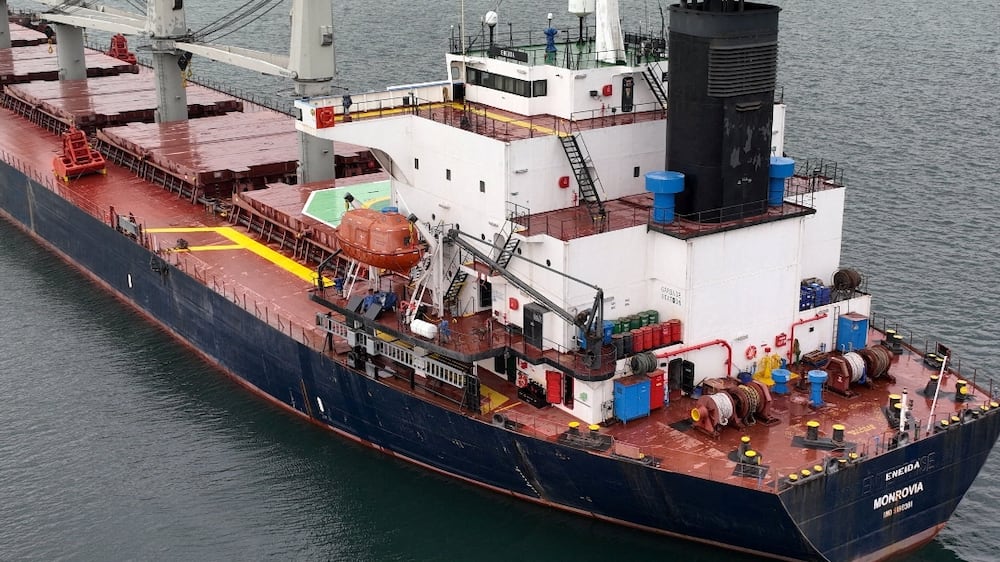Russia on Wednesday agreed to extend the deal allowing Ukrainian ships to leave the Black Sea carrying vital supplies of grain to the global market, Turkey's President Recep Tayyip Erdogan said.
The extension will help to ease a global food crisis exacerbated by the war in Ukraine, which Russia launched more than a year ago.
Mr Erdogan said that the deal would be extended for two months.
Russia confirmed the deal, with Foreign Ministry spokeswoman Maria Zakharova saying it had been extended to help countries in need. But she added that Russia's overall assessment of the situation regarding the deal “has not changed”.
The last ship covered by the deal was due to leave a port in Ukraine on Wednesday, a UN representative said before the development.
Moscowhad previously said it could quit the agreement by Thursday over obstacles facing its grain and fertiliser exports.
The UN and Turkey brokered the Black Sea deal in July for an initial 120 days.
Russia agreed to extend the deal for a further 120 days in November. In March, it agreed to a 60-day extension until May 18, whereupon it threatened to leave the deal unless a list of demands regarding its own agricultural exports was met.
Senior officials from Russia, Ukraine, Turkey and the UN met in Istanbul last week to discuss the agreement.
UN Secretary General Antonio Guterres said the deal extension was “good news for the world”, but cautioned that “outstanding issues remain”. He said representatives from Russia, Ukraine, Turkey and the UN would remain in talks.
“Looking ahead, we hope that exports of food and fertilisers, including ammonia, from the Russian Federation and Ukraine will be able to reach global supply chains safely and predictably,” he told reporters in New York.
While Russian exports of food and fertiliser are not subject to western sanctions imposed since the February 2022 invasion of Ukraine, Russia said restrictions on payments, logistics and insurance have amounted to a barrier to shipments.
The US has rejected Russia's complaints. The US ambassador to the UN, Linda Thomas-Greenfield, said last week: “It is exporting grain and fertiliser at the same levels, if not higher, than before the full-scale invasion.”
Risks
Officials from Russia, Ukraine, Turkey and the UN make up a Joint Co-ordination Centre in Istanbul, which is responsible for enacting the Black Sea deal. No new vessels have been authorised by the JCC since May 4.
Authorised ships are inspected by JCC officials near Turkey before travelling to a Ukrainian Black Sea port via a maritime humanitarian corridor to collect their cargo and return to Turkish waters for a final inspection.
Under the deal, there is one ship still in a Ukrainian port that is scheduled to depart on Wednesday with its cargo, said a UN representative, while another vessel made its way back to Turkey on Tuesday and another five ships are waiting for an outbound inspection in Turkish waters.
The UN, Turkey and Ukraine continued the Black Sea agreement in October when Russia temporarily suspended its participation.
About 30 million metric tonnes of grain and foodstuffs have been exported from Ukraine under the Black Sea deal, including nearly 600,000 metric tonnes of grain in World Food Programme vessels for aid operations in Afghanistan, Ethiopia, Kenya, Somalia and Yemen, the UN said.
Russian exports
To help persuade Russia to allow Ukraine to resume its Black Sea grain exports last year, a separate three-year agreement was struck in July last year in which the UN agreed to help Russia with its food and fertiliser exports. Under the deal:
- Russia agreed to continue commercial supplies of food and fertilisers and inform the UN of any impediments to such exports, including fertiliser raw materials such as ammonia. Russia agreed to allow the unimpeded export of food, sunflower oil and fertilisers from Ukrainian-controlled Black Sea ports
- The UN agreed to continue efforts to enable transparent unimpeded global access to Russian food and fertilisers, including fertiliser raw materials. This includes dealing with finance, insurance or logistics impediments and ensuring such exports are effectively exempt from any unilateral measures
- Russia and the UN will inform each other in writing three months in advance it they intend to stop the agreement
Russia's demands
In a letter to UN officials on March 16, Russia's UN ambassador Vassily Nebenzya said Moscow would consider extending the Ukraine Black Sea grain export deal beyond May 18 only if the following “systemic problems” were resolved:
- Returning the Russian Agricultural Bank (Rosselkhozbank) to the Swift payment system
- A resumption of supplies to Russia of agricultural machinery and spare parts
- Lifting restrictions on insurance and access to ports for Russian ships and cargo
- The resumption of an ammonia pipeline from Togliatti in Russia to Odesa in Ukraine
- Unblocking the accounts and financial activities of Russian fertiliser companies






